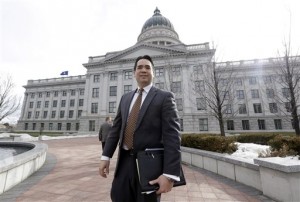
Utah is one of 11 states that filed a lawsuit Wednesday against the Obama administration for the transgender discrimination policy outlined in its “Dear Colleague” letter dated May 13.
A press release from the Utah Attorney General’s Office said the states are suing for “constitutional and statutory flaws” in the letter. Other states involved in the lawsuit include Alabama, Arizona, Georgia, Louisiana, Maine, Oklahoma, Tennessee, Texas, West Virginia and Wisconsin.
Utah Attorney General Sean Reyes said in the press release that the letter from the Obama administration “attempts to apply a single solution to all individuals,” without providing an opportunity for parents, schools, and community leaders to give their input.
“Every child is an individual,” Reyes said. “The federal government’s ‘one size fits all’ mandate, disconnected from the needs of Utah schools, disrespects individuals and ignores the law.”
Utah Governor Gary Herbert issued a statement on the lawsuit saying that local schools should “find appropriate, individualized solutions” by working directly with parents and students.
“It is unfortunate that the president has chosen to politicize our schools with such an extreme example of federal overreach,” Herbert’s statement said. “I look forward to working with other states to resolve this conflict in a way that respects the privacy of all Utah children.”
Utah Democratic Party Executive Director Lauren Littlefield said the lawsuit is “another waste of taxpayer dollars, and a giant waste of time” in a statement released Thursday.
“It is immoral and reprehensible to discriminate against our LGBT students in this way, and even worse, to do it at taxpayer expense,” Littlefield said. “Rather than creating problems where there aren’t any, Utah GOP leaders should re-evaluate their priorities and focus on the issues that will truly make a difference for Utah families.”
The letter from the U.S. Departments of Education and Justice states that public schools must “treat a student’s gender identity as the student’s sex,” according to Title IX regulations. This applies to transgender students’ participation in school activities and access to restrooms and locker rooms.
“A school may provide separate facilities on the basis of sex, but must allow transgender students access to such facilities consistent with their gender identity,” the letter states.
BYU and UVU expressed opinions this week about how these proceedings regarding the transgender directive will affect their respective campuses.
BYU spokesperson Carri Jenkins released a statement reflecting the feelings expressed by the Church of Jesus Christ of Latter-day Saints in its May 18 statement on the issue.
“BYU echoes the feelings that the LDS Church has expressed … and believes that any discussion related to access to public restrooms can be resolved under the principles outlined by the church,” BYU’s statement said.
The church’s statement acknowledged the “growing discussion” around access to public restrooms and locker rooms. The statement highlighted church principles of respecting others and finding solutions when people of goodwill come together.
“We encourage public officials to create and administer laws and regulations that properly balance issues of safety, privacy, and dignity in seeking fairness for all,” the statement said.
BYU School of Communications Director Ed Carter said he doesn’t believe recent proceedings surrounding transgender bathrooms directly impact BYU as a private university.
“The current directive from the Obama administration obviously doesn’t require BYU to (implement transgender bathrooms) or doesn’t really even suggest that they should,” Carter said. “It’s directed more at public schools.”
UVU Director of Public Relations Melinda Colton, in coordination with the school’s legal counsel, said the discussion on transgender bathrooms is not new to UVU as a public university.
“UVU has been working for the past six months on the issue of transgender access to bathrooms and locker rooms,” Colton said.
Bryan Waite, Program Director for UVU’s Center for Global & Multicultural Engagement, said he is a member of an executive team that has a “robust strategic inclusion plan” for UVU campus.
“Our main goal is to create an environment that is inclusive of all differences so that students, faculty and staff feel accepted and valued,” Waite said. “This is something we have been working towards for some time.”
Legal counsel has nothing else to add at this point about specific plans relating to the implementation of transgender bathrooms at UVU, according to Colton.
Carter said he thinks this is a complicated issue, but he believes it is a relevant topic for BYU students to consider and discuss.
“Some BYU students are studying to become teachers, and if they’re in public schools, they’ll be impacted by it,” Carter said. “BYU graduates could also be parents and their children could be in public schools.”
Carter said he hopes that BYU students, faculty and administrators will deal with these issues respectfully in personal and classroom discussions.
“These kinds of issues can be really challenging, but hopefully we can all respect each others’ points of view and have a good conversation,” Carter said. “At BYU, with the influence of the spirit, hopefully we’ll be able to maintain that respect.”




